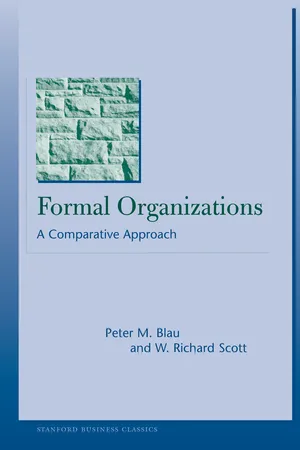
- English
- ePUB (mobile friendly)
- Available on iOS & Android
About this book
Upon its publication in 1962, this book became one of the founding texts of organizational sociology. Bringing together diverse approaches, it presented a new focus of interest: the formal organization. Blau and Scott raised the level of analysis from attention solely on individual participants and work groups to a broader understanding of organizations as collective actors.
In the book, the authors reviewed multiple types of studies—including case studies, experimental research, and surveys—and integrated them to define new central themes. They used their own empirical studies of two social welfare agencies to illustrate the ways in which varying organizational contexts shape work group and participant attitudes and activities. Formal Organizations served to integrate research on both formal and informal systems, authority and leadership, and stressed the importance of links to the wider environment. This reissue, which includes a new introduction by Scott, makes this seminal work accessible to a new generation of scholars and practitioners.
Trusted by 375,005 students
Access to over 1 million titles for a fair monthly price.
Study more efficiently using our study tools.
Information
Table of contents
- Copyright Page
- Table of Contents
- List of Tables
- Introduction to the Classic Paperback
- Preface
- CHAPTER ONE - Introduction
- CHAPTER TWO - The Nature and Types of Formal Organizations
- CHAPTER THREE - The Organization and Its Publics
- CHAPTER FOUR - The Social Structure of Work Groups
- CHAPTER FIVE - Processes of Communication
- CHAPTER SIX - The Role of the Supervisor
- CHAPTER SEVEN - Managerial Control
- CHAPTER EIGHT - The Social Context of Organizational Life
- CHAPTER NINE - Organizational Dynamics
- APPENDIX - Description and Comparison of the Two Welfare Agencies
- BIBLIOGRAPHY - [Compiled by Patricia Denton in collaboration with the authors]
- Index of Names
- Index of Topics
Frequently asked questions
- Essential is ideal for learners and professionals who enjoy exploring a wide range of subjects. Access the Essential Library with 800,000+ trusted titles and best-sellers across business, personal growth, and the humanities. Includes unlimited reading time and Standard Read Aloud voice.
- Complete: Perfect for advanced learners and researchers needing full, unrestricted access. Unlock 1.4M+ books across hundreds of subjects, including academic and specialized titles. The Complete Plan also includes advanced features like Premium Read Aloud and Research Assistant.
Please note we cannot support devices running on iOS 13 and Android 7 or earlier. Learn more about using the app